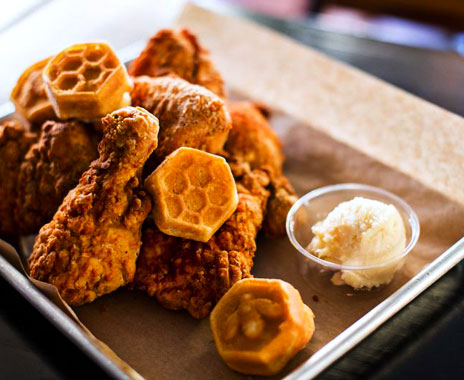Christine Cikowski and Josh Kulp are not your typical restaurateurs, and that's just the way they like it. Call them alternative or off the cuff, the close friends and business partners are growing a foodservice brand built around a relational dining experience.
Cikowski and Kulp met in culinary school in 2005 and developed an underground dinner series called Sunday Dinner Club, which hosts dinner parties for a few dozen guests around Chicago several times a month. Nine years after Sunday Dinner Club’s debut, the two continue to run the series, as well as another successful venture: Honey Butter Fried Chicken, a 60-seat fried chicken fast casual they opened last year in Chicago.
Today, the owners can reflect on how the intimate dining experience that is Sunday Dinner Club—along with its email subscriber list of 5,000 regular customers, strong social media presence, and built-in recipe test kitchen—helped them turn Honey Butter into a successful restaurant venture in a short amount of time.
“We have been fortunate to have developed a true, real connection with our customers through Sunday Dinner,” Kulp says. “They trusted us when we opened our restaurant and knew they could expect the same positive, wholesome experience. Three months in, I could look around at our 10 tables and know people by name at nine of them.”
The meticulous planning and extensive research, from recipe development to site selection, that went into Honey Butter began years ago with Sunday Dinner Club. Even though it was an “underground” dining concept, Cikowski and Kulp did everything by the book, filing for incorporation and securing licenses. The series started out of Cikowski’s Lincoln Square neighborhood apartment and later moved to various private event spaces, becoming a speakeasy of sorts. In very Chicago fashion, guests had to "know a guy" to get on the list.
The duo approached their chicken project from a culinary standpoint, scouring every cookbook with a fried chicken recipe they could find, testing them all, and relying on traditional techniques from their formal training. The pair also spent several months looking for vendors that could meet their requirements for a local, sustainable, cage- and antibiotic-free, humanely treated product. They settled on an Amish producer in Indiana who met that criteria and could handle their volume, which is around 1,000 pieces a week.
Whole chickens are brought in and butchered in-house starting at 7 a.m. Nothing goes to waste; bones removed from the breast and thigh are used to make chicken stock, while rendered chicken fat gets mixed into mashed potatoes and gravy and leftover trimmings are turned into confit for nachos. At service, the chicken pieces are double battered in buttermilk and a multi-flour blend seasoned with salt, pepper, smoked paprika, and garlic for extra flavor, then flash fried in one of the kitchen’s three 300-pound fryers.
Fried chicken purists might balk at the boneless breasts and thighs—wings and drumsticks are bone-in—but Cikowski and Kulp deliberately took a more technical, chef-driven approach.
“A lot of people prefer fried chicken with all the bones, and we understand those deep ties,” Kulp says. “But we did a ton of work and research, trying a brine with the bone and without bones, curing with and without, with and without a brine. We found that when we took the bone out and brined it, the chicken was even juicier. It’s easy to overcook chicken with bones in the fryer because you need to make sure the meat is fully cooked, but the outer parts are often done faster.”
The concept’s name stems from the signature condiment Cikowski and Kulp created initially for a side item.
“We developed honey butter to go on our biscuits, but one day we spread it on the chicken and the rest was history,” Cikowski says. “So not only do you have this juicy chicken, but a sweet, buttery sauce that melts into the meat while the outer shell stays hot and crisp.”
Paired with sides like crispy Johnnycakes (a cornmeal flatbread), green curry–spiked creamed corn, mac ‘n’ cheese, and gumbo, Honey Butter’s chicken has helped the fast casual become a modern-day comfort food respite.
The restaurant, in an underdeveloped pocket on Chicago’s Northwest Side, has just a handful of tables, but there’s a back patio for picnic-like dining that helps with overflow in the warmer months. Guests are seated after they order and pay at the counter.
Just like Sunday Dinner Club, though, it’s the people and the experience at Honey Butter that serve as its core identity. That’s especially the case with its employees; Cikowski and Kulp made several friends and connections through Sunday Dinner Club and have strong ties to their alma mater, Kendall College, as well as a solid reputation in the Chicago food community. That helped them attract the best, brightest, and most loyal staff of 30 they could find, even in a top culinary city with some of the country’s top restaurants.
The pair also honed their management skills by taking an intensive training seminar held at Zingerman’s in Ann Arbor, Michigan, by owner Ari Weinzweig, known for his bubbly, customer service–focused crew.
“One of reasons we feel we have been so successful in our short time of being open is because we set expectations for how we want to treat our people and customers,” Cikowski says. “Traditional restaurants often take a top-down brigade approach, but we wanted something different. We take more of a bottom-up approach with equality, kindness, and respect.”







